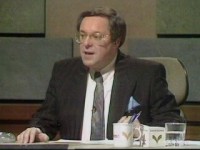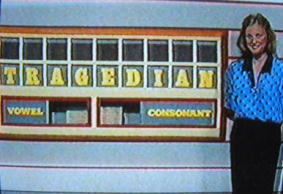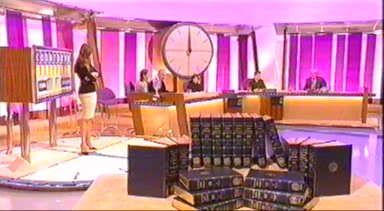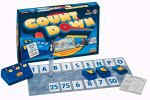Countdown
Contents |
Host
Richard Whiteley (original host to 2005)
William G. Stewart (1997 xmas special)
Des Lynam (2005-2006)
Co-hosts
Hostesses: Beverley Isherwood (series 1-2), Kathy Hytner (series 1-14), Karen Loughlin (series 14-16), Lucy Summers (series 17), Carol Vorderman thereafter
"Vital staticians": Dr Linda Barrett (series 1-3), Carol Vorderman (all series)
Lexicologists: Susie Dent (current, since series 24). Others with over 100 appearances include Catherine Clarke, Damian Eadie, Mark Nyman, Richard Sampson, Julia Swannel, Della Thompson, Freda Thornton
Broadcast
Calendar Countdown (ITV Yorkshire region only), 19 April to 31 May 1982 (8 episodes)
Countdown: Yorkshire TV (now as Granada) for Channel 4, 2 November 1982 to present
Countdown Masters (insert in The Channel 4 Daily) 3 April 1989 - 29 March 1991 (97 games aired + 1 partially aired + 6 unaired)
Celebrity Countdown (primetime) 23 April to 18 June 1998 (8 episodes)
Synopsis
"I'll have a consonant, a vowel, another vowel, a consonant, another consonant. Another consonant, a vowel, a consonant and a final consonant please Carol."
That might sound boring to you, but this show - together with Fifteen-to-One until its demise - props up Channel 4's afternoon schedule and shed loads of pensioners, students and other people with nothing better to do at 3.30pm than watch it.
Countdown was based on the late Armond Jammot's French show and the format has proved popular throughout much of the world. It could be argued that the Brit version is the more lively interpretation of the format.
The first British incarnation of the show was a Yorkshire TV regional filler for eight weeks in the spring of 1982. Richard Whiteley hosted, and it's probably fair to say that the show did not immediately distinguish itself. Luckily, at around the same time Channel 4 were looking for a game show for their launch line-up, and happened upon the French format Des chiffres et des lettres. Since Yorkshire was already making a British version, they pretty much just transferred the show to Channel 4. Whiteley stayed on, a number of young ladies were brought in to do all the odd jobs around the studio - mainly sticking magnetic tiles in a frame - and the rest is history.
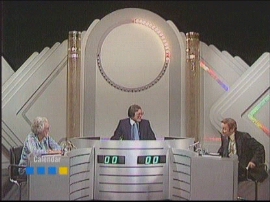 How the pilot looked (though obviously it didn't have that modern bug in the corner). This snazzy minimalist clock was replaced with something more like the familiar clock face for the series proper.
How the pilot looked (though obviously it didn't have that modern bug in the corner). This snazzy minimalist clock was replaced with something more like the familiar clock face for the series proper.The idea is as simple as can be: Two players duel in a battle of vocabulary knowledge and numerical agility.
Eleven (originally six) rounds are letters games, where the players try and make the longest word they can from nine pseudo-randomly selected letters. Each player takes turns at selecting the make-up of vowels and consonants in that nine. After thirty seconds of thinking time, to which we're treated to the famous Countdown think music, the players declare the words that they have. One point per letter is awarded to the contestant that has the longest word. In the case of ties, both players get the points.
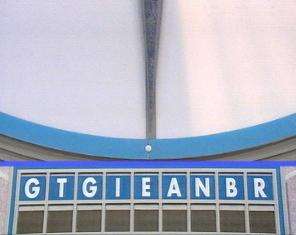 A letters game in progress - what's the longest word you can find? (answer below)
A letters game in progress - what's the longest word you can find? (answer below)After each game, we go across to another corner of the studio where a guest celebrity (the Guardian of the Dictionaries) plus an oh-so-handily placed lexicographer from the Oxford English Dictionary tell us about any longer words that they have found. (Such are the demands of rapid recording, the production team sometimes prime the celeb with words found manually via an earpiece - but contrary to what some people believe, they don't use electronic wordfinders or any of that malarkey.)
 One of the regular GotD's - Nigel Rees
One of the regular GotD's - Nigel ReesThree (originally two) numbers games where players use their arithmetical skills in order to get to a target number using only the six numbers they've got and the four basic number operations. The numbers are chosen from a board which contains the numbers from 1 to 10 twice over, and one each of 25, 50, 75 and 100. Contestants can ask for any combination of small and large numbers, but they are drawn at random from within each group. An electronic computer called CECIL selects a target number from 101 to 999 inclusive at random. After thirty seconds, the solutions are checked. Ten points if you can get the number spot on, seven points if you're within five, and five points if you're within ten. Only the contestant that is closest to the target gets the points, though.
Finally, there's the conundrum, a nine letter anagram on the buzzers for a final ten points. If this decides the game, as it often does, it is referred to as the "Crucial Countdown Conundrum".
The winner gets to return on the next show, up to eight programmes maximum (undefeated people being referred to these days as Octochamps). The eight top performers from the whole series go on to an end-of-series playoff, including a final.
 Beverley Isherwood and Kathy Hytner
Beverley Isherwood and Kathy HytnerThe original hostesses were Kathy Hytner and Beverley Isherwood, who used to select the letters and numbers cards respectively. Either Linda Barrett or Carol Vorderman was wheeled on twice a show (they did alternate programmes) to check the calculations for the numbers game. Carol Vorderman now does all these jobs.
For ten years, Carol Vorderman seemed painfully obscure and then she sort of exploded randomly onto every programme going. Richard Whiteley on the other hand was just strangely obscure from the start. Or was that just his ties? Or his godawful puns?
The final, and in a way the most crucial, member of the team is the resident lexicologist, who rules on the admissibility of words and (usually) suggests better ones, often pointing them out in the dictionary with the aid of a hand-held "pencam". Traditionally this post was filled by someone sent up from the OUP, often Catherine Clark, Della Thompson or Richard Sampson. In the 1990s, series producers (and former champs) Mark Nyman and Damian Eadie frequently turned up in Dictionary Corner instead, but nowadays the role is permanently filled by Susie Dent, who first appeared way back in 1992, but has only gone "full time" since 2003. Her catchphrase: "Fantastic!".
Inevitably with such a successful format, Champion of Champions and Celebrity versions have been made. There was also the short-lived Countdown Masters, a daily five minute item on The Channel 4 Daily, where the same two contestants played a letters game, a numbers game and a conundrum each weekday for a week.
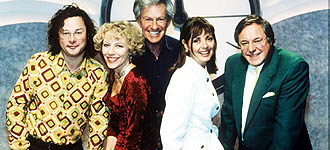
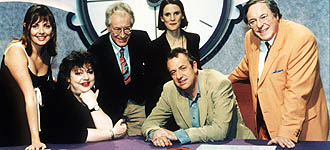 Celebs from two editions of Celebrity Countdown: (top) Hugh Fearnley-Whittingstall, Jilly Goolden, Patrick Lichfield with Carol and Richard; (bottom) Carol, Jo Brand, Bamber Gascoigne, Susie Dent (from the OED), Arthur Smith, Richard.
Celebs from two editions of Celebrity Countdown: (top) Hugh Fearnley-Whittingstall, Jilly Goolden, Patrick Lichfield with Carol and Richard; (bottom) Carol, Jo Brand, Bamber Gascoigne, Susie Dent (from the OED), Arthur Smith, Richard.It is perhaps comforting to know that a programme of this kind can still hold its head up in a world where people's attention span rarely lasts more than thirty seconds.
And the longest word you can find in that letters game above is REBATING or BERATING. Badda... badda... badda-daa-da.... boom!
Key moments
If someone discovers a nine-letter word in one of the normal letters games, they receive 18 points (i.e. double 9) for it. And the set flashes, which is nice.
One famous out-take came from a 1991 Champion Of Champions semi-final between Gino Corr and Lawrence Pearse, which contained an interesting word claimed by both players (seven letters, begins with W):
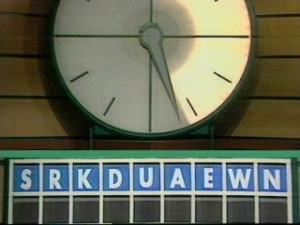
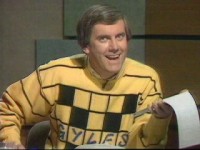
Of course, they could have had DARKENS or ASUNDER for seven points - but where's the fun in that?
Catchphrases
"There's nine in the frame, let's get on with the game."
"Let's go ferr'et" (a reference to an infamous out-take, much repeated on It'll Be Alright on the Night, where Richard Whiteley - in his more usual role as a news reader for Yorkshire TV - had his finger bitten by a ferret). Richard started staying this because he didn't have a catchphrase and so he thought he'd invent one of his own. But then he stopped saying it. The lad's got no staying power.
Later he started saying "the best bits are at the beginning", which almost took off. But not quite.
Daily winners can play for up to 8 matches before they're booted off. Richard used to call these Octochamps, later Octavians.
Catch-tune: Da da da da da-da-da-da BOOM!
Inventor
Based on the French show, Des Chiffres et Des Lettres (Digits and Letters), devised by the late Armand Jammot. The programme has been running on French television since 1972. We can't understand why, because it's slow and boring.
Theme music
Composed by Alan Hawkshaw, who - natch - also composed the think music. Apparently, he gets a royalty every time the clock is started.
Trivia
Broadcast info
Countdown was the first programme ever broadcast on Channel 4, and Richard Whiteley was the first face to be seen. Richard's first words at the start of the very first episode of Countdown were: "As the countdown to the start of a brand new channel ends, a brand new Countdown begins."
Countdown was originally commissioned for just seven weeks. However, it has stood the test of time. It celebrated its 1000th edition on July 2nd 1990, its 2000th edition on May 23rd 1997, its 3000th edition on April 27th 2001 and its 4000th edition on 3 January 2006.
The listing in the TV Times for the very first episode at 4.45pm on 2nd November 1982 went as follows: "A great new quiz to launch Channel Four. Countdown combines entertainment and intellectual tease as it juggles letters, numbers, anagrams and sums. Contestants compete against the clock and against former Brain of Britain star, farmer Ted Moult and his team of statisticians and wordsmiths. It's light-hearted but educational as Ted tells us about the origins of certain words. And it's a game for the family at home - so have pens and paper ready. Presented by Richard Whiteley, Countdown will be on screen four nights a week from Monday to Thursday."
The following week's TV Times contained the following cryptic billing: Fi uoy anc orwk tou hits margana ouy rea lysuoivbo a ededvot afn fo Countdown. Otinght ehrte si orme ufn iwth gifures, eiswrcaksc dna ordsw. Dirty Wheelchair stsoh, hwit Dem O'Tult.
Until 1991, if a game ended in a tie, the two contestants would return the next day for a replay. Additional conundrums were only used in the series final. But after no less than four tied games in series 21, the format was changed so that additional conundrums were used in all games that ended level until there was a winner.
The series 53 grand final was the 3,959th episode of Countdown and Richard presented all but one of these episodes. The only other person to have hosted Countdown is William G. Stewart who fronted the 1997 Christmas special, a match between Richard and Carol. He also hosted a This Is Your Life-style retrospective which was broadcast immediately after the 1999th edition (though it's not considered a proper Countdown episode.)
Until 2001 the show was half an hour long with the grand finals 45 minutes long. All episodes are now 45 minutes long.
Countdown went six days a week in January 2006, making up a game show double-bill with Deal or No Deal from Monday to Saturday. Although Des and Carol made a big deal of this being the "first ever" time the show had been aired on a Saturday, this had actually happened a few times before (albeit not as a regular thing), the first time being the grand final of series 2 way back in July 1983. Three games in series 14 were broadcast on Saturdays in 1987 leading up to the first Christmas Day final (there were also Christmas Day finals four years running from 1998, and again in 2004), and another episode went out on Saturday in July 1989 because Channel 4 had something else on the Friday. In January 1985 one episode even went out on a Sunday, due to its regular Wednesday slot being usurped that week. (Thanks to Chris Wills for pointing this out.)
Contestants
Contestants have ranged in years from 8 (Tanmay Dixit, James Squires) to 87 (Bertha Bourne). The youngest champion is 14-year-old Conor Travers, winner of series 54.
Multiple winner Mark Nyman (see Champions below) produced the programme for many years, as well as appearing in Dictionary Corner and writing several of the Countdown puzzle books. He is also known as a veteran Scrabble champion.
Current producers Michael Wylie and Damian Eadie are also both former series finalists - Wylie was runner-up in series 1, Eadie was champion of series 28.
Series winner David Acton asked for the CD-ROM version of the dictionary as his prize, because he was a vegan and didn't approve of the leather-bound version.
Child genius Allan Saldhana was awarded a complete OED despite losing the series 15 final after it was discovered that lexicologist Julia Swannel had made a mistake in disallowing the perfectly acceptable word "yolked".
Notable words
The aforementioned Tanmay Dixit is famous, nay infamous, for offering FARTED and FANNIES during the first of his three appearances on the programme.
In 2001, Bruno Murray offered ORGASMED out of the selection ADIRGOMES, to which Carol, for once, lost it a bit: "Yes! Yes! It is allowed." Richard concluded, "That's the first orgasm we've had on this show in 18 years."
The word COUNTDOWN has appeared as the Countdown Conundrum twice: on the first Channel 4 show on 2 November 1982, and again on 22 November 2001. CONUNDRUM was used for the first series final. On a similar tip, the conundrum used on the 1000th programme was, appropriately enough, MILLENIUM. Unfortunately, the producers got this wrong - the correct spelling is MILLENNIUM. However, the contestant (child sensation Allan Saldanha) got the correct answer so he was given the 10 points.
Hostesses
Hostesses Beverley Isherwood and Karen Loughlin were both third-placed finalists in Miss United Kingdom - Isherwood in 1978, and Loughlin a year later. Isherwood also hostessed for Where in the World?.
When Karen Loughlin replaced Kathy Hytner as "the letters girl", a lot of press attention was focused on the fact that she had been an extra in the movie A View To A Kill: "Glamorous Bond Girl Joins Countdown", that sort of thing.
Game equipment
CECIL, the random number generator for the numbers games, stands for Countdown Electronic Calculator in Leeds. The name was apparently chosen in honour of Cecil Korer, Channel 4's first head of light entertainment, who commissioned the show. On the earlier Calendar Countdown, the numbers were generated by a mechanical device with spinning drums called, for some reason, Harry. Harry's "hundreds" drum had a zero on it, so potentially anything from zero to 999 could have turned up. CECIL only generates numbers from 101 up.
One of the most common questions about the show is whether the clock goes all the way round. And the answer is: yes, it does. The hand moves clockwise all the way round back to the top. In the early days it took 30 seconds to do this, but nowadays it whizzes round in four or five seconds. When they originally designed it, they weren't sure how long the rounds would be, so they made it possible for it to count up to 50 seconds. There are bulbs in the left-hand side but they're not connected up, they're just spares. When Noel Edmonds did his "Gotcha" on Richard Whiteley, in one round the music had been specially re-edited to go on for 40 seconds, but the clock still stopped at 30.
Speaking of the music, in the early 90s they tried to introduce a jazzed-up version of the 30-second vamp. It didn't survive for very long.
The letter and number tiles used on Calendar Countdown were going to be white on red, until someone pointed out that they are two excellent colours to trigger epileptic fits. Instead, yellow on grey was chosen and this was kept when the show moved to Channel 4. They were replaced in 1989 by the present white-on-blue sets.
Miscellaneous
One of the regulars on French original Des Chiffres et Des Lettres is Bertrand Renard, who appeared in the audience for the 500th edition of Countdown in 1987 - and solved a numbers game that Carol couldn't!
The show is probably best known in America for the appearance of a few clips in the 2002 Hugh Grant movie About a Boy. In the mid 80s a pilot for an American version of Countdown was made, but was scrapped after being considered too brainy.
When Richard Whiteley went into hospital with pneumonia in 2005, there were plans to continue Countdown over the summer with a series of guest presenters, rather like Have I Got News for You. Richard Digance, Lesley Garrett, Esther Rantzen, Barry Norman, Tim Rice, Nicholas Owen and Jennie Bond were all lined up to do five shows each. Richard died the day before filming was due to begin, and so the recordings were abandoned as a mark of respect.
The very last conundrum on Richard's last programme before his sad departure, the series 53 grand final, was - ironically - LIFEFAIDS (answer: FALSIFIED). It was one of the very rare games in which a second conundrum had to be used to break a tie. In fact three conundrums had to be used on the day, but one which nobody got was cut from the finished programme.
From series 54 onwards, contestants are awarded the Richard Whiteley Memorial trophy, as well as leather-bound Oxford English Dictionary.
Champions
Regular Series
| 1982 | 1. Joyce Cansfield | 1990 | 19. Michael Wareham | 1998 | 38. John Ashmore |
| 1983 | 2. Ash Haji | 20. Liz Barber | 39. Kate Ogilvie | ||
| 3. Andrew Guy | 1991 | 21. Barry Grossman | 1999 | 40. Terence English | |
| 1984 | 4. Brian Hudson | 22. Chris Waddington | 41. Scott Mearns | ||
| 5. Peter Evans | 1992 | 23. Gareth Williams | 2000 | 42. Michael Calder | |
| 1985 | 6. Darryl Francis | 24. Wayne Summers | 43. Graham Nash | ||
| 7. Ian Bebbington | 1993 | 25. Don Reid | 2001 | 44. Stuart Wood | |
| 1986 | 8. Clive Spate | 26. Andy Bodle | 45. John Rawnsley | ||
| 9. David Trace | 1994 | 27. David Elias | 46. Ben Wilson | ||
| 10. Harvey Freeman | 28. Damian Eadie | 2002 | 47. Chris Wills | ||
| 1987 | 11. John Clarke | 1995 | 29. Darren Shacklady | 48. Julian Fell | |
| 12. Stephen Balment | 30. Verity Joubert | 2003 | 49. John Davies | ||
| 13. Hilary Hopper | 1996 | 31. David Acton | 50. Chris Cummins | ||
| 14. Nic Brown | 32. Alan Sinclair | 2004 | 51. Stewart Holden | ||
| 1988 | 15. Dick Green | 1997 | 34. Huw Morgan | 52. Mark Tournoff | |
| 16. Tony Vick | 35. Pete Cashmore | 2005 | 53. John Mayhew | ||
| 1989 | 17. Lawrence Pearse | 36. Tony Baylis | 2006 | 54. Conor Travers | |
| 18. Rajaretnam Yogasagarar | 37. Ray McPhie |
Supreme Championship
1996 33. Harvey Freeman
Champion of Champions
1-4. Mark Nyman (runner-up, series 3)
5-8. Clive Freedman (semi-finalist, series 7)
9-12: Harvey Freeman (champion, series 10)
13-16: Nic Brown (champion, series 14)
17-20: Tim Morrissey (semi-finalist, series 17)
21-24: Wayne Summers (champion, series 24)
25-28: Don Reid (champion, series 25)
29-32: Chris Rogers (runner-up, series 29)
34-37: Natascha Kearsey (runner-up, series 35)
38-41: Scott Mearns (champion, series 41)
42-48: Graham Nash (champion, series 43)
49-54: Paul Gallen (runner-up, series 52)
Champion of Champion of Champions
Mark Nyman won this title in a special match against Clive Freedman to open series 10. He also later beat the third C-of-C, Harvey Freeman, in a match in the Countdown Masters series.
Merchandise
 Official Countdown Dictionary Listing of all allowable Countdown words
Official Countdown Dictionary Listing of all allowable Countdown words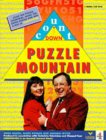 Countdown Puzzle Mountain Puzzle book
Countdown Puzzle Mountain Puzzle bookCountdown: Spreading The Word by Michael Wylie and Damain Eadie (book)
Web links
Stuck on a numbers game? Check out Robovord.
Mike's Countdown page - eclectic fan site
Pictures
 Picture 1 - Celeb June Whitfield joins Carol and Richard in congratulating winner Barry Grossman in front of the famous Countdown clock. From the Supreme Championship in 1996.
Picture 1 - Celeb June Whitfield joins Carol and Richard in congratulating winner Barry Grossman in front of the famous Countdown clock. From the Supreme Championship in 1996. Picture 2 - Richard and Carol pick up a game show award for Countdown.
Picture 2 - Richard and Carol pick up a game show award for Countdown.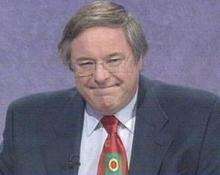 Picture 3 - Richard Whiteley.
Picture 3 - Richard Whiteley.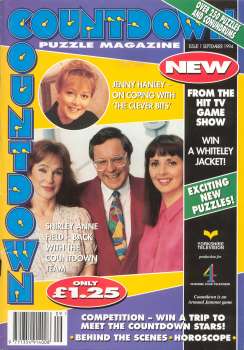 Picture 4 - Issue 1 of the Countdown puzzle magazine.
Picture 4 - Issue 1 of the Countdown puzzle magazine.
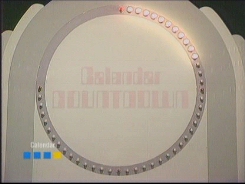
 The dream team -
The dream team - 